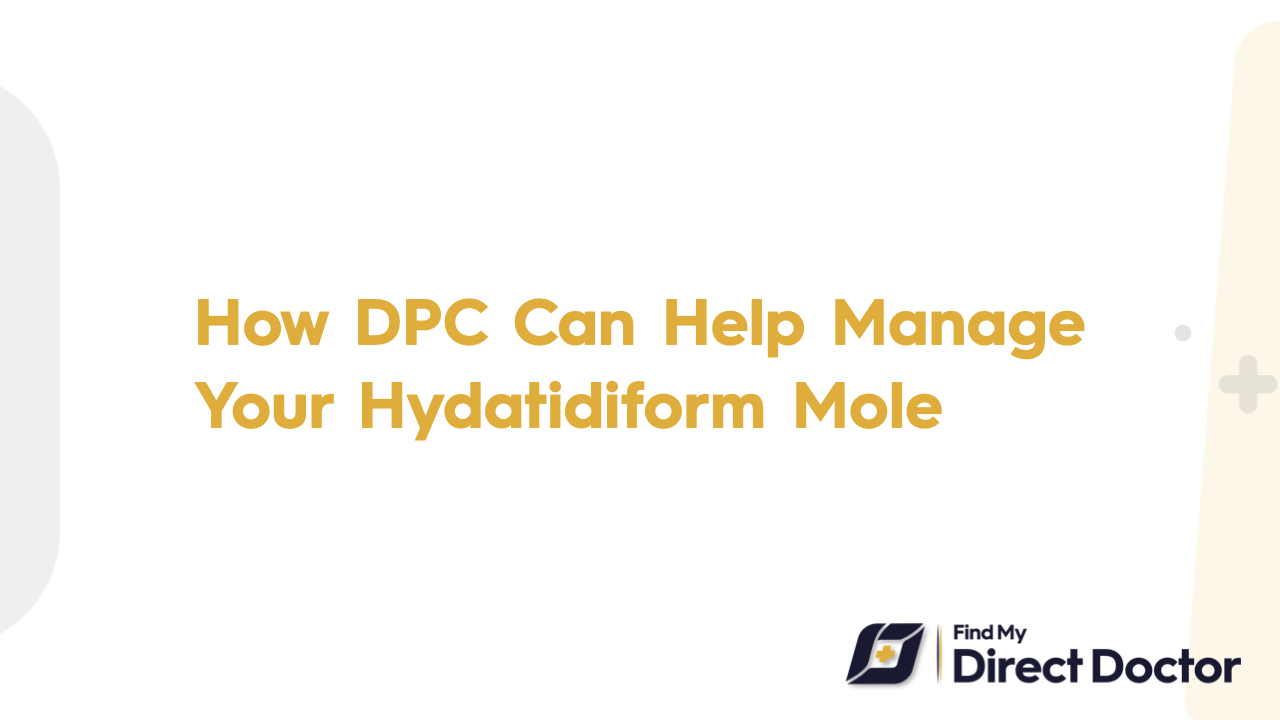



A rare pregnancy problem called a hydatidiform mole, or molar pregnancy, is brought on by an aberrant growth of trophoblastic tissue inside the uterus. This kind of gestational trophoblastic disease (GTD) might be partial, meaning that some aberrant fetal tissue is present along with the mole, or full, meaning that there is no normal fetal tissue. Genetic abnormalities during fertilization are the cause of this illness.

Vaginal bleeding, extreme nausea and vomiting, pelvic pain, and abnormally fast uterine growth in comparison to a typical pregnancy are all signs of a hydatidiform mole. Preeclampsia symptoms can occasionally appear in women early in pregnancy. To guarantee a timely diagnosis and course of treatment, these symptoms call for an urgent medical evaluation.
Because Direct Primary Care (DPC) provides individualized, focused care, it is essential for controlling a hydatidiform mole. In order to spot anomalies early in the pregnancy, DPC professionals make sure that regular prenatal monitoring is conducted. Your DPC provider can walk you through the required diagnostic procedures, including ultrasound and blood testing to assess hCG levels, if signs of a molar pregnancy appear.
When a hydatidiform mole is identified, DPC providers arrange for the necessary medical treatment, which frequently include removing the mole surgically using a technique known as dilatation and curettage (D&C). In order to ensure the full resolution of the problem and identify any potential consequences, such as chronic trophoblastic disease, DPC clinicians provide ongoing care following treatment through routine follow-ups to monitor hCG levels.
DPC's individualized therapy is very beneficial to patients with hydatidiform moles. The strong bond between the patient and the provider guarantees that your issues will be resolved quickly and that you will have access to medical assistance when required. This is particularly crucial for a condition that needs emotional support and close monitoring.
By removing obstacles like protracted wait times and fragmented care, DPC streamlines the healthcare process. From initial diagnosis to post-treatment monitoring, your DPC physician oversees every facet of your health, providing a smooth and all-encompassing care experience. In order to identify uncommon issues and aid in recovery, this continuity of treatment is essential.
The emotional and mental assistance that DPC providers provide during a trying time is another important advantage. Although receiving a hydatidiform mole diagnosis can be daunting, DPC's committed and approachable care guarantees that you will feel supported during your course of treatment.
DPC focuses on developing a personalized care plan that is suited to your particular medical requirements and situation. Personalized care for a problem such as a hydatidiform mole entails proactive risk or complication management, tailored follow-up plans, and routine monitoring.
If advanced care is needed, your DPC practitioner works closely with experts like oncologists or obstetricians. They also make sure you are aware of your illness, available treatments, and the healing process. You may navigate your healthcare path with clarity and confidence thanks to this collaborative approach.
DPC prioritizes healing and emotional health in addition to medical care. Following treatment, to lower the chance of recurrence, your provider will evaluate your health and provide advice on how to get ready for future pregnancies. You get all-encompassing, sensitive care from DPC that attends to your mental and physical health requirements.